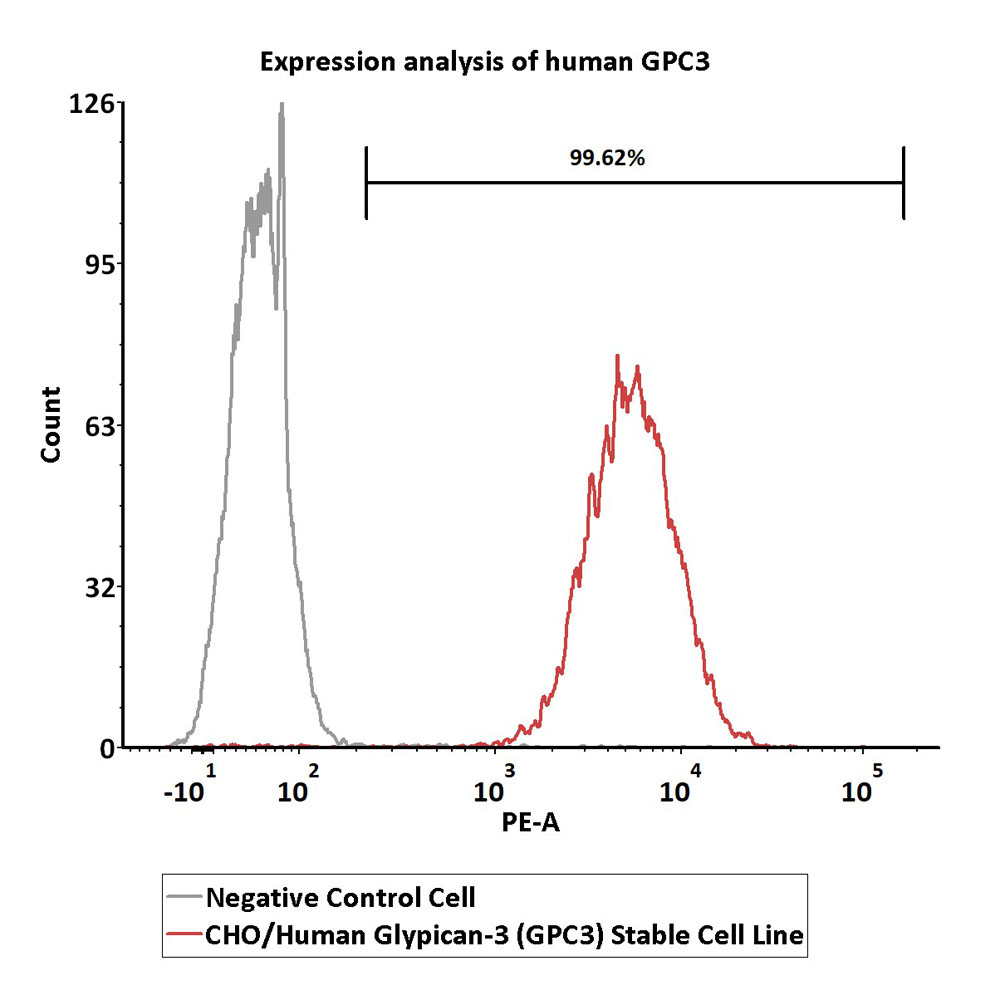| GPC-3298306 |
GPC-3298306 |
Phase 2 Clinical |
National Cancer Center Of Japan |
Ovarian Neoplasms; Carcinoma, Hepatocellular |
Details
|
| BOS-342 |
PRS-342; BOS-342; PRS-342/BOS-342 |
Phase 2 Clinical |
Pieris Pharmaceuticals |
Solid tumours; Carcinoma, Hepatocellular |
Details
|
| BOXR-1030 |
BOXR-1030 |
Phase 2 Clinical |
Unum Therapeutics Inc |
Liver Neoplasms; Carcinoma, Merkel Cell; Carcinoma, Squamous Cell; Lung Neoplasms; Liposarcoma, Myxoid; Carcinoma, Hepatocellular |
Details
|
| AZD-5851 |
AZD-5851; AZD5851 |
Phase 2 Clinical |
Astrazeneca Plc |
Carcinoma, Hepatocellular |
Details
|
| SAR-444200 |
SAR-444200 |
Phase 2 Clinical |
Sanofi |
Solid tumours; Neoplasms |
Details
|
| CAR-GPC3 T-cell (Drum Tower Hospital) |
|
Phase 2 Clinical |
Nanjing Drum Tower Hospital |
Carcinoma, Hepatocellular |
Details
|
| GPC3 CAR-T therapy (Hrain Biotechnology) |
|
Phase 2 Clinical |
Hrain Biotechnology Co Ltd |
Carcinoma, Hepatocellular |
Details
|
| CM-350 |
CM-350 |
Phase 2 Clinical |
Keymed Biosciences Co Ltd |
Solid tumours |
Details
|
| GPC3-CAR-T cell therapy(Origincell Medical Technology) |
Ori-CAR-001; Ori-C101(OriCell) |
Phase 2 Clinical |
OriCell Therapeutics Co Ltd |
Carcinoma, Hepatocellular |
Details
|
| ECT-204 |
JWATM-204; ECT-204 |
Phase 2 Clinical |
Eureka Therapeutics Inc, Jw Therapeutics (Shanghai) Co Ltd |
Liver Neoplasms; Carcinoma, Hepatocellular; Carcinoma, Non-Small-Cell Lung |
Details
|
| Codrituzumab |
GC-33; RG-7686; RO-5137382 |
Phase 1 Clinical |
Chugai Pharmaceutical Co Ltd, F. Hoffmann-La Roche Ltd |
Solid tumours; Carcinoma, Hepatocellular |
Details
|
| GPC3-T2 CAR-T cell therapy (The Second Affiliated Hospital of Guangzhou Medical University) |
|
Phase 1 Clinical |
Second Affiliated Hospital Of Guangzhou Medical University |
Carcinoma, Squamous Cell; Carcinoma, Hepatocellular |
Details
|
| GLYCAR T cell therapy (Baylor College of Medicine) |
GLYCAR |
Phase 1 Clinical |
Baylor College Of Medicine |
Rhabdomyosarcoma; Liver Neoplasms; Rhabdoid Tumor; Hepatoblastoma; Wilms Tumor; Liposarcoma; Carcinoma, Hepatocellular; Endodermal Sinus Tumor |
Details
|
| Anti-GPC3 CAR T-cell therapy (Nanjing University) |
|
Phase 1 Clinical |
Nanjing University |
Carcinoma, Hepatocellular |
Details
|
| GPC3-CAR-T cell therapy |
CSG-GPC-3; CAR-GPC3 T-cell; GPC3-CAR/CSG-GPC3; anti-GPC-3 CAR T; KJgpc3-001; CT-011 |
Phase 1 Clinical |
Carsgen Biomedicine (Shanghai) Co Ltd |
Solid tumours; Carcinoma, Squamous Cell; Carcinoma, Hepatocellular |
Details
|
| Anti-GPC3 chimeric antigen receptor T cell therapy (Hunan Zhaotai Yongren Biotech/Guangdong Zhaotai Invivo Biomedicine) |
|
Phase 1 Clinical |
Hunan Zhaotai Yongren Biotech Co Ltd, Guangdong Zhaotai Invivo Biomedicine Co Ltd |
Carcinoma, Squamous Cell; Carcinoma, Hepatocellular |
Details
|
| EU-307 |
EU307 |
Phase 1 Clinical |
Eutilex |
Liver Neoplasms; Carcinoma, Hepatocellular |
Details
|
| BC-2027 |
BC2027; BC-2027 |
Phase 1 Clinical |
Biocity Biopharmaceutics Co Ltd |
Liver Neoplasms; Solid tumours |
Details
|
| JMT-106 |
JMT106; JMT-106 |
Phase 1 Clinical |
CSPC Pharmaceutical Group Ltd |
Solid tumours |
Details
|
| GPC3/Mesothelin-CAR-γδT Cells therapy(Second Affiliated Hospital Of Guangzhou Medical University) |
|
Phase 1 Clinical |
Second Affiliated Hospital Of Guangzhou Medical University |
Solid tumours; Liver Neoplasms; Small Cell Lung Carcinoma; Pancreatic Neoplasms; Mesothelioma; Lung Neoplasms |
Details
|
| NWRD-06 |
NWRD-06; NWRD06 |
Phase 1 Clinical |
Newish Technology (Beijing) Co Ltd |
Carcinoma, Hepatocellular |
Details
|
| GPC3-targeted CAR-T (Peking University) |
|
Phase 1 Clinical |
Peking University |
Carcinoma, Hepatocellular |
Details
|
| CAR (hYP7)-T cells (National Cancer Institute) |
|
Phase 1 Clinical |
National Cancer Institute |
Liver Neoplasms; Carcinoma, Hepatocellular |
Details
|
| CT0181 |
CT-0181 |
Phase 1 Clinical |
CARsgen Therapeutics Holdings Ltd |
Carcinoma, Hepatocellular |
Details
|
| TC-CAR-031 |
C-CAR-031; TC-CAR-031; TC-CAR031; C-CAR031 |
Phase 1 Clinical |
Zhejiang University, Cellular Biomedicine Group Inc |
Carcinoma, Hepatocellular |
Details
|
| IM-83 CAR-T cell therapy |
IM-83; IM83 |
Phase 1 Clinical |
Beijing Immunochina Medical Science & Technology Co Ltd |
Liver Neoplasms; Neoplasms; Carcinoma, Hepatocellular |
Details
|
| CT-017 |
CT-017 |
Phase 1 Clinical |
Carsgen Biomedicine (Shanghai) Co Ltd |
Carcinoma, Hepatocellular |
Details
|
| JWATM-214 |
JWATM-214; JWATM214 |
Phase 1 Clinical |
Suzhou Yaomingjunuo Biotechnology Co Ltd |
Liver Neoplasms; Carcinoma, Hepatocellular |
Details
|
| TH-012(Bangentai Biomedical) |
TH-012 |
Phase 1 Clinical |
Shandong Bangentai Biomedical Tech Group Co Ltd |
Stomach Neoplasms; Pancreatic Neoplasms |
Details
|
| B010-A |
B010-A |
Phase 1 Clinical |
Shanghai Pharmaceuticals Holding Co Ltd |
Carcinoma, Hepatocellular |
Details
|
| CT-0180 |
CT-0180 |
Phase 1 Clinical |
CARsgen Therapeutics Holdings Ltd |
Carcinoma, Hepatocellular |
Details
|
| ERY-974 |
ERY-974 |
Phase 1 Clinical |
Chugai Pharmaceutical Co Ltd |
Solid tumours; Carcinoma, Hepatocellular |
Details
|
| TAK-102 |
TAK-102 |
Phase 1 Clinical |
Noile-Immune Biotech Inc |
Solid tumours; Neoplasms |
Details
|
| C-CAR031 CAR T-cell therapy (AbelZeta) |
C-CAR031 |
Clinical |
AbelZeta Pharma Inc |
Carcinoma, Hepatocellular |
Details
|
| Anti-GPC3-IRDye800CW |
|
Clinical |
Chinese Academy Of Sciences |
|
Details
|
| GPC-3298306 |
GPC-3298306 |
Phase 2 Clinical |
National Cancer Center Of Japan |
Ovarian Neoplasms; Carcinoma, Hepatocellular |
Details
|
| BOS-342 |
PRS-342; BOS-342; PRS-342/BOS-342 |
Phase 2 Clinical |
Pieris Pharmaceuticals |
Solid tumours; Carcinoma, Hepatocellular |
Details
|
| BOXR-1030 |
BOXR-1030 |
Phase 2 Clinical |
Unum Therapeutics Inc |
Liver Neoplasms; Carcinoma, Merkel Cell; Carcinoma, Squamous Cell; Lung Neoplasms; Liposarcoma, Myxoid; Carcinoma, Hepatocellular |
Details
|
| AZD-5851 |
AZD-5851; AZD5851 |
Phase 2 Clinical |
Astrazeneca Plc |
Carcinoma, Hepatocellular |
Details
|
| SAR-444200 |
SAR-444200 |
Phase 2 Clinical |
Sanofi |
Solid tumours; Neoplasms |
Details
|
| CAR-GPC3 T-cell (Drum Tower Hospital) |
|
Phase 2 Clinical |
Nanjing Drum Tower Hospital |
Carcinoma, Hepatocellular |
Details
|
| GPC3 CAR-T therapy (Hrain Biotechnology) |
|
Phase 2 Clinical |
Hrain Biotechnology Co Ltd |
Carcinoma, Hepatocellular |
Details
|
| CM-350 |
CM-350 |
Phase 2 Clinical |
Keymed Biosciences Co Ltd |
Solid tumours |
Details
|
| GPC3-CAR-T cell therapy(Origincell Medical Technology) |
Ori-CAR-001; Ori-C101(OriCell) |
Phase 2 Clinical |
OriCell Therapeutics Co Ltd |
Carcinoma, Hepatocellular |
Details
|
| ECT-204 |
JWATM-204; ECT-204 |
Phase 2 Clinical |
Eureka Therapeutics Inc, Jw Therapeutics (Shanghai) Co Ltd |
Liver Neoplasms; Carcinoma, Hepatocellular; Carcinoma, Non-Small-Cell Lung |
Details
|
| Codrituzumab |
GC-33; RG-7686; RO-5137382 |
Phase 1 Clinical |
Chugai Pharmaceutical Co Ltd, F. Hoffmann-La Roche Ltd |
Solid tumours; Carcinoma, Hepatocellular |
Details
|
| GPC3-T2 CAR-T cell therapy (The Second Affiliated Hospital of Guangzhou Medical University) |
|
Phase 1 Clinical |
Second Affiliated Hospital Of Guangzhou Medical University |
Carcinoma, Squamous Cell; Carcinoma, Hepatocellular |
Details
|
| GLYCAR T cell therapy (Baylor College of Medicine) |
GLYCAR |
Phase 1 Clinical |
Baylor College Of Medicine |
Rhabdomyosarcoma; Liver Neoplasms; Rhabdoid Tumor; Hepatoblastoma; Wilms Tumor; Liposarcoma; Carcinoma, Hepatocellular; Endodermal Sinus Tumor |
Details
|
| Anti-GPC3 CAR T-cell therapy (Nanjing University) |
|
Phase 1 Clinical |
Nanjing University |
Carcinoma, Hepatocellular |
Details
|
| GPC3-CAR-T cell therapy |
CSG-GPC-3; CAR-GPC3 T-cell; GPC3-CAR/CSG-GPC3; anti-GPC-3 CAR T; KJgpc3-001; CT-011 |
Phase 1 Clinical |
Carsgen Biomedicine (Shanghai) Co Ltd |
Solid tumours; Carcinoma, Squamous Cell; Carcinoma, Hepatocellular |
Details
|
| Anti-GPC3 chimeric antigen receptor T cell therapy (Hunan Zhaotai Yongren Biotech/Guangdong Zhaotai Invivo Biomedicine) |
|
Phase 1 Clinical |
Hunan Zhaotai Yongren Biotech Co Ltd, Guangdong Zhaotai Invivo Biomedicine Co Ltd |
Carcinoma, Squamous Cell; Carcinoma, Hepatocellular |
Details
|
| EU-307 |
EU307 |
Phase 1 Clinical |
Eutilex |
Liver Neoplasms; Carcinoma, Hepatocellular |
Details
|
| BC-2027 |
BC2027; BC-2027 |
Phase 1 Clinical |
Biocity Biopharmaceutics Co Ltd |
Liver Neoplasms; Solid tumours |
Details
|
| JMT-106 |
JMT106; JMT-106 |
Phase 1 Clinical |
CSPC Pharmaceutical Group Ltd |
Solid tumours |
Details
|
| GPC3/Mesothelin-CAR-γδT Cells therapy(Second Affiliated Hospital Of Guangzhou Medical University) |
|
Phase 1 Clinical |
Second Affiliated Hospital Of Guangzhou Medical University |
Solid tumours; Liver Neoplasms; Small Cell Lung Carcinoma; Pancreatic Neoplasms; Mesothelioma; Lung Neoplasms |
Details
|
| NWRD-06 |
NWRD-06; NWRD06 |
Phase 1 Clinical |
Newish Technology (Beijing) Co Ltd |
Carcinoma, Hepatocellular |
Details
|
| GPC3-targeted CAR-T (Peking University) |
|
Phase 1 Clinical |
Peking University |
Carcinoma, Hepatocellular |
Details
|
| CAR (hYP7)-T cells (National Cancer Institute) |
|
Phase 1 Clinical |
National Cancer Institute |
Liver Neoplasms; Carcinoma, Hepatocellular |
Details
|
| CT0181 |
CT-0181 |
Phase 1 Clinical |
CARsgen Therapeutics Holdings Ltd |
Carcinoma, Hepatocellular |
Details
|
| TC-CAR-031 |
C-CAR-031; TC-CAR-031; TC-CAR031; C-CAR031 |
Phase 1 Clinical |
Zhejiang University, Cellular Biomedicine Group Inc |
Carcinoma, Hepatocellular |
Details
|
| IM-83 CAR-T cell therapy |
IM-83; IM83 |
Phase 1 Clinical |
Beijing Immunochina Medical Science & Technology Co Ltd |
Liver Neoplasms; Neoplasms; Carcinoma, Hepatocellular |
Details
|
| CT-017 |
CT-017 |
Phase 1 Clinical |
Carsgen Biomedicine (Shanghai) Co Ltd |
Carcinoma, Hepatocellular |
Details
|
| JWATM-214 |
JWATM-214; JWATM214 |
Phase 1 Clinical |
Suzhou Yaomingjunuo Biotechnology Co Ltd |
Liver Neoplasms; Carcinoma, Hepatocellular |
Details
|
| TH-012(Bangentai Biomedical) |
TH-012 |
Phase 1 Clinical |
Shandong Bangentai Biomedical Tech Group Co Ltd |
Stomach Neoplasms; Pancreatic Neoplasms |
Details
|
| B010-A |
B010-A |
Phase 1 Clinical |
Shanghai Pharmaceuticals Holding Co Ltd |
Carcinoma, Hepatocellular |
Details
|
| CT-0180 |
CT-0180 |
Phase 1 Clinical |
CARsgen Therapeutics Holdings Ltd |
Carcinoma, Hepatocellular |
Details
|
| ERY-974 |
ERY-974 |
Phase 1 Clinical |
Chugai Pharmaceutical Co Ltd |
Solid tumours; Carcinoma, Hepatocellular |
Details
|
| TAK-102 |
TAK-102 |
Phase 1 Clinical |
Noile-Immune Biotech Inc |
Solid tumours; Neoplasms |
Details
|
| C-CAR031 CAR T-cell therapy (AbelZeta) |
C-CAR031 |
Clinical |
AbelZeta Pharma Inc |
Carcinoma, Hepatocellular |
Details
|
| Anti-GPC3-IRDye800CW |
|
Clinical |
Chinese Academy Of Sciences |
|
Details
|
 Request a FREE Sample of our FcRn Binding Kit!
Request a FREE Sample of our FcRn Binding Kit! Request a FREE Sample of our Fc gamma RI / CD64 Binding Kit !
Request a FREE Sample of our Fc gamma RI / CD64 Binding Kit !  Happy Holiday! Limited Keychain here with your next order
Happy Holiday! Limited Keychain here with your next order Happy Holiday! Limited Keychain here with your next order
Happy Holiday! Limited Keychain here with your next order  Request a FREE sample of our GMP products!
Request a FREE sample of our GMP products!  Request a FREE sample of our GMP products!
Request a FREE sample of our GMP products!












